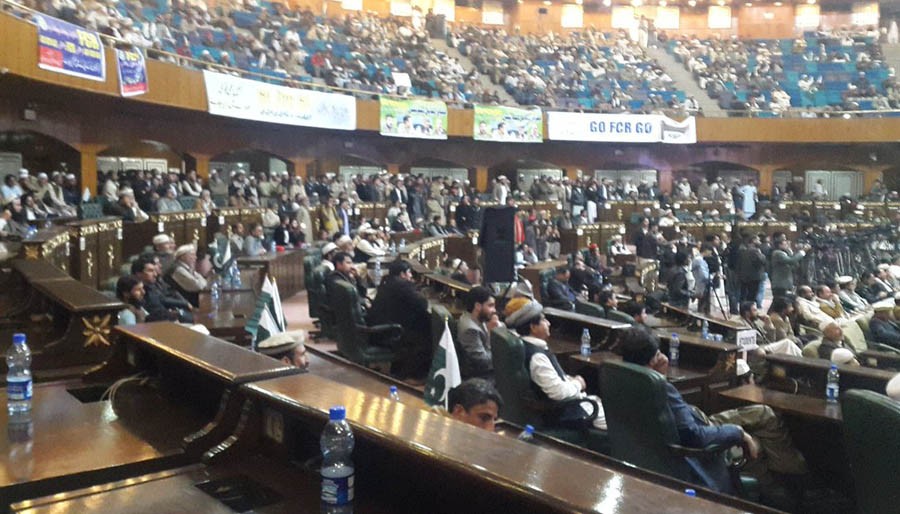
Dragging feet on Fata’s merger with KPK will have negative political implications for the state of Pakistan

There is a long history of commissions and reports on mainstreaming Federally Administered Tribal Areas (Fata) -- all are now only of some historical and academic significance. Is the current proposed reform package also destined to become one of them? What are the hurdles on an issue over which there is almost national consensus? Except for two political parties -- PkMAP and JUI-F -- all parties big or small, left-centre and right support the mainstreaming of Fata through merger with KP, though differences on specific issues do exist.
The current move towards a change in Fata status was almost done and people were congratulating each other, when it was suddenly shelved. Why? But first why and how was it created. There were many moves by different committees, both governmental and non-governmental, some involving political parties, for quite some time.
In 2016, the government formed a high level committee, in response to Fata’s MNAs taking it collectively to the National Assembly (NA). The formation of this committee, despite many shortcomings, raised hopes for a change like never before. The committee’s report came in August 2016. It was widely welcomed by all sections of the society throughout Pakistan, except for JUI-F and PkMAP. It was believed that the PML-N government will implement the report of its own committee; however, it asked the committee for further deliberations. After the second round of consultations, the committee again presented its final report.
Once again euphoria erupted. The two above-mentioned parties again opposed it. It was expected that the federal cabinet will now immediately approve it and then the NA will do so. However, the government delayed it. Finally, after some delay the proposals were adopted and then after some more delay presented in the National Assembly. People exchanged felicitations, especially in Fata and Khyber Pakhtunkhwa. But for the third time, people were disappointed as the NA session was prorogued without the ‘change package’ being discussed, let alone adopted.
Many questions keep propping up. How and why suddenly in early 2016 a serious move towards change in Fata’s status appeared? However, when almost everyone was convinced that Fata was about to become a normal part of Pakistan through Khyber Pakhtunkhwa, the move seems to be delayed, if not shelved and gradually so much polluted that it may become almost useless.
If one looks closely, neither the sudden surge nor the undue delay is surprising. One has to understand the state of Pakistan and the level of maturity of democratic political culture. People sensed, rightly or wrongly, the sudden raising of the issue by Fata parliamentarians and the positive response by the PML-N government had at least a part of the ‘establishment’ behind it. That perception was strengthened by history as Fata parliamentarians are not known for taking such bold independent stands.
The PPP, which has much stronger commitment for mainstreaming Fata, could not do much. The PML-N, not known for any fundamental changes, acted much stronger in favour of a change in Fata. The initial delay had created doubts when the report was sent again for further deliberations in 2016. By the time, the second report came in early 2017 and it continuously got delayed without any apparent reason, a perception developed that the state has got cold feet.
The view within the establishment that it needs the camouflage provided by the existing (non) system was needed for strategic purposes, apparently prevailed over the view that favoured change. One can add to that the vested interests in civilian bureaucracy too, but more important is the lack of any democratic control of the state and the inability of the state to think and act innovatively. The post-colonial state of Pakistan prefers treading the known path and is afraid of any real change.
Despite popular belief, the opposition from Maulana Fazl-ur-Rehman or Mehmood Khan Achakzai had nothing much to do with it. The PPP’s opposition at this stage is based on correct principled position -- calling the Rewaj Act that was supposed to replace FCR as the carbon copy of FCR. But, the PPP did it for petty political purpose to deny the PML-N any credit. However, had it known that the PML-N will have cold feet, the PPP may have demanded its immediate implementation.
The PTI supported the merger, but never made it part of its popular campaign. The ANP’s support for the change has been vocal and consistent but it is of not much political weight due to its weaker public standing. The PML-N, despite leading the change move and being in the government, did not have any political commitment to the change.
The PML-N, in the process, has lost a historic opportunity to gain the goodwill of people in Fata and Khyber Pakhtunkhwa, as well as within the democratic views in rest of Pakistan, which could have had a positive impact on its standing in the 2018 elections. It could have dispelled the accusation that the PML-N is only a party for constructing roads.
The delay is fatal. Even if the change is announced after a few months, it will face more problems than it would have faced earlier.
To conclude, Pakistan has lost an opportunity to make a strong leap forward on the road to democratisation. However, with all its weaknesses and limitations and delays, the debate on change this time around has raised so much hope among people and created such a tremendous pressure, that completely avoiding it would have extremely negative political implications for the state of Pakistan.
The perceptions among Pakhtuns generally and those of Fata about Pakistani state not interested in their wellbeing will strengthen and thus will further alienate them, something which it can ill afford in the prevailing and emerging regional and international geo political space. In short, reversal/status quo is no more an option.